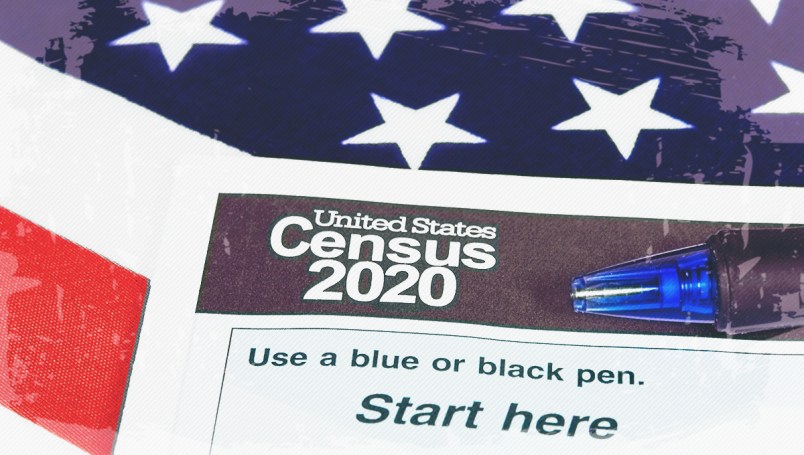A federal judge will announce Wednesday whether he wants to take another crack at deciding whether the Trump administration’s move to add a citizenship question to the census was discriminatory.
U.S. District Judge George Hazel held a nearly three-hour-long hearing Tuesday to discuss what he should do about new evidence put forward by the groups who had challenged the census citizenship question in a case brought in Maryland.
Hazel had previously ruled that adding the citizenship question violated administrative law as well as the Constitution’s Enumeration Clause, by threatening the accuracy of the census. Hazel had declined to rule in favor of the challenger’s claims that it was added with the intent of discriminating against Latinos.
The challengers are now asking Hazel to reconsider that finding in light of the new evidence, specifically the files of a now-deceased GOP consultant who was involved in the push to add the citizenship question.
If Hazel decided to reconsider, he would still have to ask the 4th U.S. Circuit Court of Appeals — where his ruling has been appealed — to remand the case back to him. He’ll say by Wednesday whether he is taking that step, the judge said in court on Tuesday.
The request by the challengers in the Maryland case is separate from the one made in the census citizenship case in New York. There, the challengers are asking the judge to sanction two witnesses for allegedly obscuring role played by the consultant, Thomas Hofeller, in the administration’s effort.
The Maryland challengers — which include MALDEF and Asian Americans Advancing Justice — argued Tuesday that Judge Hazel could make a finding that the addition of the question was discriminatory based on the materials — including the relevant documents and emails found on Hofeller’s hard drives — they have already filed with the court.
But they also laid out of a path of discovery they could take if the judge thought it necessary. That discovery could include subpoenaing Hofeller’s work partner, taking more depositions from the individuals involved in the government’s push to add the citizenship question, and seeking to obtain internal administration documents previously withheld in the litigation.
If Hazel decides to grant the challengers’ request Wednesday, it’s not clear which route he would take.
The Justice Department, represented by Josh Gardner on Tuesday, questioned the authenticity of the newly offered evidence, and whether it proved Hofeller was really involved or that his reasons for advocating the question were in fact discriminatory.
Gardner said that even if Hofeller was involved, it “tells the court nothing” of Commerce Secretary Wilbur Ross’ motives for adding the question.
Hazel brought up that he had already concluded that Ross’ official reason for adding the question — to improve Voting Rights Act enforcement — was pretextual.
“I found that it was pretextual for something else,” Hazel said. “What the something else is, is what we’re deciding.”
Hazel, however, also grilled the challengers on the argument put forward by the Justice Department that they were bringing a new theory for why the administration wanted to add the question, that was separate than the theory they argued at trial.
Their current request hinges in a secret 2015 study in which Hofeller said drawing legislative districts based on citizens, rather than total population, would boost Republicans and non-Hispanic whites. But such a redistricting overhaul would need a citizenship question on the census to be workable, Hofeller concluded.
The Justice Department argued that the redistricting theory is separate than the argument the challengers made at trial: that the question was being added to produce an undercount of Latinos and other immigrant populations by chilling their participation on the census.
Shankar Duraiswamy, a lawyer for the challengers, said that the undercount effect and redistricting effect were two different methods to get at the same motive: reducing the political representation Latinos and other immigrant groups receive.
Hazel seemed to go back and forth on whether he agreed with that argument. But he did say he agreed with the challengers’ framework that he should be able to consider the new evidence of discriminatory intent on top of the discriminatory evidence that had already been put forward in the case.
Near the end of the hearing, Hazel told the challengers the Justice Department had “raised a point” about the issue of authenticating the new documents and suggested that they address that point, which they did.
There was also some discussion about the timing of this current request, given that the Supreme Court will likely decide within the next week or two, in the New York case, whether the question can remain on the census. The Justice Department argued that it was possible that the Supreme Court would decide the discriminatory intent question then, even though it was not fully briefed for the justices. Hazel said that it was “unlikely” the 4th U.S. Circuit Court of Appeals would decide the discriminatory intent issue before the end of the month.










